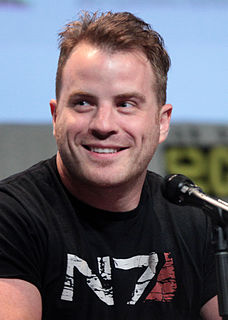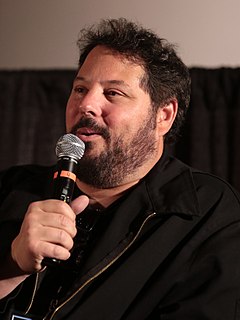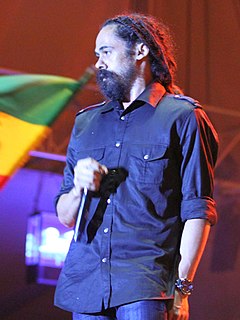A Quote by John August
You're looking, moment by moment and scene by scene, how you can tell the most interesting story. So, we had this great short and we knew that we had a story about a boy and his dog. Because we had that pure emotional core, we could go on crazy tangents and always come back to Victor and Sparky. When I wrote in stuff like Weird Girl and the cat poop, Dutch Day and the windmill, it felt like it was part of Tim's universe.
Related Quotes
At this rate, I'd be lucky if I wrote a page a day. Then I knew what the problem was. I needed experience. How could I write about life when I'd never had a love affair or a baby or even seen anybody die? A girl I knew had just won a prize for a short story about her adventures among the pygmies in Africa. How could I compete with that sort of thing?
I don't particularly like the idea that there's an arc to the story and that therefore in this scene you have to convey this bit of information or emotion. I like more the feeling that, of course, there is a shape to the story, but that each scene should feel right, should be true at that moment, and that gradually you accumulate these moments of truth until you get enough of them together that it becomes a story that's interesting.
I always try to find something or some way of delivering the lines or playing the scene that you wouldn't normally expect. And I know that sounds weird, because it's not like I surprise people with shocking performances. But in an interesting way... Just being real and as interesting as possible. Usually, that stuff is the spine of the show. It's the humor that you need in a scene, in an intense moment or something.
Looking back, I do think one of the reasons 'Thirteen Reasons Why' has been so successful is not because it deals with serious issues but because I had a unique and interesting way to tell that story. I knew the issues were going to be dealt with in the book, but I felt my job was to write the story as entertainingly as possible.
The only time I felt like a weird exploiter - even though I knew I wasn't one - was when I was writing a sex scene between me and my adorable co-star [Adam Driver] in which he had to tell me how much he loved my potbelly. It seemed like a weird wish-fulfillment thing, where I'm directing my own fantasy.
The scene I had just witnessed (a couple making love in the ocean) brought back a lot of memories – not of things I had done but of things I had failed to do, wasted hours and frustrated moments and opportunities forever lost because time had eaten so much of my life and I would never get it back. I envied Yeoman and felt sorry for myself at the same time, because I had seen him in a moment that made all my happiness seem dull.
As for me: I loyally remained right where I was, remembering the very first I had ever seen the boy and then just now, the very last time-and all the times in between. The deep aching grief I knew I would feel would come soon enough, but at that moment mostly what I felt was peace, secure in the knowledge that by living my life the way I had, everything had come down to this moment. I had fulfilled my purpose.
He had handed his daughter to Caroline Gill and that act had led him here, years later, to this girl in motion of her own, this girl who had decided yes, a brief moment of release in the back of a car, in the room of a silent house, this girl who had stood up later, adjusting her clothes, with now knowledge of how that moment was already shaping her life.
In Jamaica, them always have throwback riddims, recycled old beats, and the hardcore reggae scene is always present. You have faster stuff like the more commercialized stuff, but you always have that segment of music that is always from the core, from the original root of it. This year, you have seen a lot of it explode on the international scene. It's great. People are looking for something different. Maybe there was too much of one thing, and now they're looking for something fresh.
It [the memoir "In The Body of the World"] wrote me. I joke about it, but this book was so unusual. It just started to come out. I really feel like it came straight from my body. I think it was both an expression of what I had gone through, but also it just felt like everything had come together in my body and it needed to tell that story.
If you gauge how you're doing on whether somebody is responding vocally or not, you're up a creek. You can't do that; you kind of have to be inside of your work and play the scene. And tell the story every day. Tell the story. Tell the story. Regardless of how people are responding, I'm going to tell the story.






































